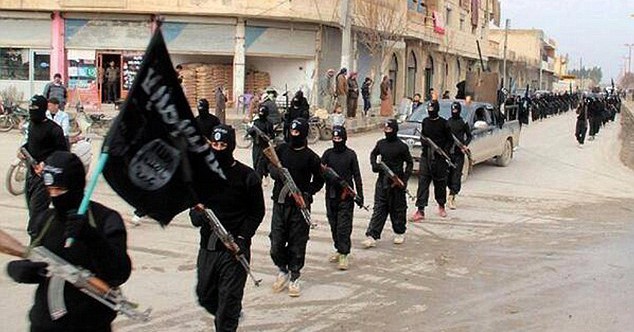
Islamic State (ISIS) militants in Mosul may have contracted Ebola, according to Iraqi media reports of suspected cases at an ISIS-controlled hospital in the city.
The government and Kurdish media reported that militants were displaying symptoms similar to those of Ebola. The World Health Organization has not been able to confirm this but has offered assistance to Iraqi officials.
Iraq’s official pro-government newspaper, al Sabaah, said Ebola arrived in Mosul from “terrorists” who came “from several countries” in Africa, reports Mashable. It is uncertain, however, if any ISIS recruits came from the Ebola-ravaged regions of West Africa. Most have come from Tunisia, Morocco, Libya, Egypt, Algeria, Sudan and Somalia.
A number of other illnesses could be to blame for the militants’ symptoms. Malaria, Lassa fever, yellow fever and the Marburg virus could all be confused with Ebola as they can also cause fever, nausea, vomiting and diarrhea.
WHO spokesman Christy Feig told the the Daily Mail that the agency is attempting to communicate with people inside Mosul in hopes of containing the disease before it begins to spread, if in fact it has somehow traveled from western Africa to the Middle Eastern state (which, at this point, seems unlikely).
However, Feig warned, communication with ISIS-held areas is spotty and investigating the claims could be a complicated and dangerous process, given the extremely violent nature of the extremist group.
ISIS, a group that has been known to dismiss many aspects of science and modern medicine, recently executed a number of Iraqi doctors in Mosul for refusing to treat militants. UN workers have also been prohibited from entering their territory, an intelligence analyst who specializes in Iraq told Mashable.
Could ISIS use Ebola as a biological weapon?
Fears over the potential use of Ebola as a biological weapon, either by the Islamic State or others, have been rekindled in the face of the world’s worst Ebola outbreak, which has killed almost 8,000 people and infected more than 20,000, according to the latest WHO figures. In November, Spain’s State Secretary for Security, Francisco Martinez, warned that “the use of Ebola as a poisonous weapon against the United States” had been discussed by terrorists in “jihadist chat rooms”.
While most experts agree that the risk posed by Ebola as a biological weapon is low in Western nations like the U.S., it could pose a greater threat to the conflict-ridden region controlled by ISIS, where poor health provision, lack of education, and unsanitary conditions would create a hotbed of disease. Amanda Teckman, author of the paper “The Bioterrorist Threat of Ebola in East Africa and Implications for Global Health and Security”, warned that “the threat of an Ebola bioterrorist attack in East Africa is a global health and security concern, and should not be ignored,” adding:
The increase in natural outbreaks in the region, coupled with a possibility of a terrorist group recruiting experts to acquire the virus and to prepare it to use as a bioweapon, should lead policymakers to consider the risk of a deliberate outbreak. This prospect is worthy of consideration, particularly in East Africa due to the history of terrorist attacks by different groups in the area; the potential for these groups to obtain Ebola in the field; the lack of political capacity in the region and global will to develop a vaccine; and the pathogen’s natural occurrence in the region. The possibility of a deliberate outbreak in East Africa is a global health and security issue because of Ebola’s contagiousness in a globalized world; the increasing rate at which Ebola is appearing; the fear that could potentially arise from misinformation during an outbreak; and the lack of a vaccine.
National security and infectious disease experts say it’s unlikely that ISIS could carry out the technical tasks that would be needed to transform Ebola into a tool capable of launching a large-scale attack. To be successful, “it would take a state-type [agent]” with more extensive resources, Dr. Anthony Fauci, the director of the National Institute of Allergy and Infectious Diseases, told a Congressional committee in September.

Experts say it’s unlikely that ISIS has the expertise to weaponize Ebola, but isolated suicide attacks are a concern in Africa and the middle east.
However, there is concern that ISIS or other terrorist groups could simply dispatch individuals to Ebola-infected areas in West Africa, where they would intentionally infect themselves and then spread the virus through the world’s air transportation network.
Capt. Al Shimkus, a professor of national security affairs at the U.S. Naval War College, said the scenario was plausible. “The individual exposed to the Ebola virus would be the carrier,” Shimkus told Forbes. “In the context of terrorist activity, it doesn’t take much sophistication to go to that next step to use a human being as a carrier.”
ISIS has already contemplated the use of biological weaponry, according to some media reports. In August, Foreign Policy reported that a laptop seized from ISIS militants in Syria was found to contain documents with instructions on how to “develop biological weapons and how to weaponize the bubonic plague from infected animals.” The laptop reportedly belonged to a Tunisian militant named Mohammad S., who studied chemistry and physics in his country’s northeast and was apparently planning to use his knowledge of the subject to help ISIS develop biological weapons. “The advantage of biological weapons is that they do not cost a lot of money, while the human casualties can be huge,” the militant wrote in one of the documents.
While the idea is certainly terrifying, experts say Ebola would be a relatively ineffective biological weapon, as it is not easily transmitted from person-to-person, unlike other other infectious pathogens such as anthrax or plague. However, Ebola could be very effective as psychological warfare. With Ebola fears already at an all-time high, the mere thought of ISIS militants using the virus as a weapon is enough to invoke terror across much of the world.
